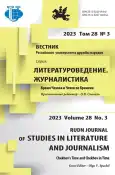100th anniversary of Anton Chekhov’s death in Barcelona
- Авторлар: Amiraghyan H.1
-
Мекемелер:
- Pompeu Fabra University
- Шығарылым: Том 28, № 3 (2023): Chekhov’s Time and Chekhov in Time
- Беттер: 509-518
- Бөлім: LITERARY CRITICISM
- URL: https://journal-vniispk.ru/2312-9220/article/view/319065
- DOI: https://doi.org/10.22363/2312-9220-2023-28-3-509-518
- EDN: https://elibrary.ru/NDIJPQ
- ID: 319065
Дәйексөз келтіру
Толық мәтін
Аннотация
The interest towards Anton Chekhov’s theatre entered a new phase in the end of the seventies of the 20th century in Barcelona. A quarter of century after Franco’s death the translations of Chekhov’s plays into Catalan and representations thereof recorded a new growth: translators and artists were trying to fill the gap resulting from the cultural crisis suffered under the dictatorship by introducing into the national cultural system some of the most recognized authors of the world, already considered classics in the western neighbour countries (France, Great Britain, Germany). The 100th anniversary of Chekhov’s death offered a perfect occasion to pay tribute to the Russian author’s memory. The present research sums up the principal events dedicated to the centenary of Chekhov’s death in 2004 in Barcelona and focuses on the staging of “Uncle Vanya” by Joan Ollé, one of the most memorable interpretations of this play in Catalonia, in order to evaluate the reception thereof through the analysis of periodical issues. Based on Hans-Robert Jauss’s approach to the literature as a constant interaction between the work of art, the public and the author, the study sheds light on the reception of Chekhov’s theatre in Catalonia and its evolution from the first direct translation of the play until a key staging which, in turn, became a reference for the following generations. The analysis concludes that the centenary of Chekhov’s death may be considered an inflection point in the history of his reception in Catalonia. Thanks to the production of the first canonical staging of “Uncle Vanya” in Catalan, Chekhov’s name stopped being associated exclusively with popular performances produced by foreign companies.
Авторлар туралы
Hasmik Amiraghyan
Pompeu Fabra University
Хат алмасуға жауапты Автор.
Email: hasmik.amiraghyan@upf.edu
ORCID iD: 0009-0001-0326-1981
Doctor of Philological Sciences, PhD student, Department of Translation and Language Sciences
10-12 Plaça de la Mercè, Barcelona, 08002, Kingdom of SpainӘдебиет тізімі
- Almazan, G. (2004, Noviembre 15). L’oncle Txèkhov. El Triangle (p. 42).
- Asociación de Directores de Escena de España. (2005). Chéjov a la vuelta de cien años. ADE Teatro, (104).
- Benach, J.-A. (2004, Noviembre 8). El poderío del actor. La Vanguardia.
- Corbert, J.L. (1979, Mayo 25). «L’oncle Vània», de Chejov. La Vanguardia.
- Cuadrado, N. (2004, Octubre 29). Joan Ollé busca alejar a su «Oncle Vània» del naturalismo. El Mundo (p. 62).
- El TNC y el Liure se unen para celebrar el centenario Chejov. (2004, Noviembre 6). La Vanguardia (p. 70).
- Fonalleras, J.M. (2004, Noviembre 5). El cogote de Vania. La Vanguardia (p. 32).
- Fondevila, S. (2004, Julio 8). El Teatre Nacional consolida sus tres salas con casi un 80% de ocupación. La Vanguardia (p. 41).
- Ginart, B. (2004, Octubre 29). El Lliure conmemora el centenario de la muerte de Chéjov con l’Oncle Vània. El País (p. 55).
- «Happy hour», una reescritura contemporánea de «Tío Vania», de Chéjov, llega al teatro Borràs de Barcelona. (2005, Enero 18). El País (Catalunya) (p. 30).
- Jauss, H.-R. (2000). La historia de la literatura como provocación. Barcelona: Península.
- M.M. (2004, Octubre 29). Joan Ollé fa una «macedònia teatral» amb «L’oncle Vània». Avui (p. 57).
- Ordóñez, M. (2004, Diciembre 4). Notas sobre «Oncle Vania». A propósito de la obra de Chéjov dirigida por Joan Ollé en el Teatre Lliure de Barcelona. El País (p. 22).
- Ragué, M.J. (2004, Noviembre 18). «Tío Vania». El Cultural. https://www.elespanol.com/el-cultural/escenarios/teatro/20041118/tio-vania/500567_0.html (consulta: 29.05.2023).
- Sesé, T. (2004, Octubre 19). Joan Ollé dirige un «Oncle Vania» de múltiples tonalidades. La Vanguardia (p. 50).
- Txèkhov, A. (1999). Teatre complet (vol. 2). Barcelona: Institut del Teatre de la Diputació de Barcelona.
Қосымша файлдар









